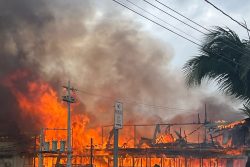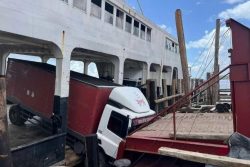Exactly what President Nicolás Maduro thinks he is doing has everyone perplexed. Even if he is determined to play the part of the local playground bully, his timing seems a little off. There is President David Granger at the United Nations preparing to give his address at the General Assembly in which the subject of Venezuela’s earlier aggressions this year were to figure prominently, and there is the Head of State next door supplying him with even more dramatic ammunition. Surely Mr Maduro can’t think that threatening a small neighbour with anti-aircraft missiles, when that neighbour has no military hardware worthy of the name, will be viewed sympathetically at a forum like the UN?
And it is not just that President Granger is giving the annual speech there; he along with his team, will be ideally placed to have bilaterals with a whole range of countries, and explain to their representatives both the context and the reality of what is going on. Taking geography and limited diplomatic resources into account, it is a fast way to get a message across.
Surely, it can’t be that Miraflores believes that Guyana’s Head of State can be intimated into toning down his speech, and restricting his contacts in New York? That would make absolutely no sense.
And surely it can’t be either that Mr Maduro is sending a message to UN Secretary General Ban Ki-moon that he should decide to continue with the Good Offices process, and not refer the controversy over Venezuela’s contention that the 1899 Award is null and void to the International Court of Justice in The Hague. It is the latter which Guyana wants, and Venezuela does not want, for the obvious reason that it is very unlikely to win the case. But if there are military movements of any substance on the border, might not the Secretary General be persuaded that the controversy should be referred to The Hague with some dispatch?
Having said that, it is not as if there seems to be any immediate likelihood that Guyana would be invaded, although like the Boy Scouts, one should always be prepared. But in all seriousness, even the Venezuelans can’t believe they need missiles to make incursions into our jungle. After all, what are they going to do with them? Shoot down a Canje Pheasant? The only country which might be watching the Venezuelan army trundling ancient Russian-made missiles along the frontier with a jaundiced eye, would be Brazil.
Furthermore, our neighbour’s latest antics are interestingly confined to our land border, not the Atlantic, which has absorbed the attention of Caracas for most of this year, and produced the infamous decree whereby Venezuela claimed sovereignty over our waters offshore Essequibo. This, it will be remembered, was triggered by the announcement by Exxon Mobil of a significant oil find offshore Demerara, which is within the Stabroek Block that encompasses Essequibo waters as well.
What is often not generally recognized by the populus, although it was made clear by Brigadier Mark Phillips at a press conference, is that the whole of the Cuyuni River belongs to Guyana. Yet here we have the Venezuelan military at the current time zooming up and down in their gunboats as if it were their waterway. In effect, therefore, there has been a limited invasion of Guyana, because our neighbour’s forces are effectively in our territory. However, it has to be acknowledged that this is far from being the first time that their soldiers have operated as if the Cuyuni was their river, and the previous government was very reluctant either to confront Caracas on this issue, or authorize greater assertiveness on the part of the GDF on this riverine portion of the boundary.
Venezuela occupied our half of the island of Ankoko as long ago as 1966, and they have a military base there which is playing a role in the current manoeuvres. What one does not want is a creeping acquisition of territory in the form of controlling the Cuyuni River as well, and where military patrols from the Venezuelan bank become something of a fixture.
As for President Maduro, once again, what are his objectives, assuming these are rational? The Venezuelan opposition and many other critics are in no doubt about what all this concerns, and they believe that it has less to do with Guyana than it has with Venezuela itself. Venezuela goes to elections to vote for members of its National Assembly on December 6, and the polls are not looking too healthy for Mr Maduro, whose party it is said, might even lose. The popularity of the President himself is at its lowest ebb ever, largely because the country has the highest inflation rate by far in this hemisphere, and because the food shelves in the supermarkets are empty. Even some traditional chavista supporters are thoroughly disillusioned. The adventurism in relation to Guyana, say political aficionados, is simply designed to deflect attention from the crisis within Venezuela itself.
As with Guyana, so with Colombia too, which has also been on the receiving end of Venezuela’s bellicosity. The Venezuelans actually closed the border with that neighbour causing endless confusion, inconvenience and actual suffering, in some cases. However, pressure from Latin nations had been exerted on Miraflores to meet with the Colombians to resolve the issue, and President Santos of Colombia finally met his Venezuelan counterpart on Tuesday in Ecuador, with Presidents Correa of that country and President Vásquez of Uruguay acting as middlemen. Guyana had enjoyed a temporary respite from Venezuelan attentions while Caracas was occupied with Colombia, so could it be that since President Maduro thought he could not keep that going for too much longer, it was Guyana’s turn again?







